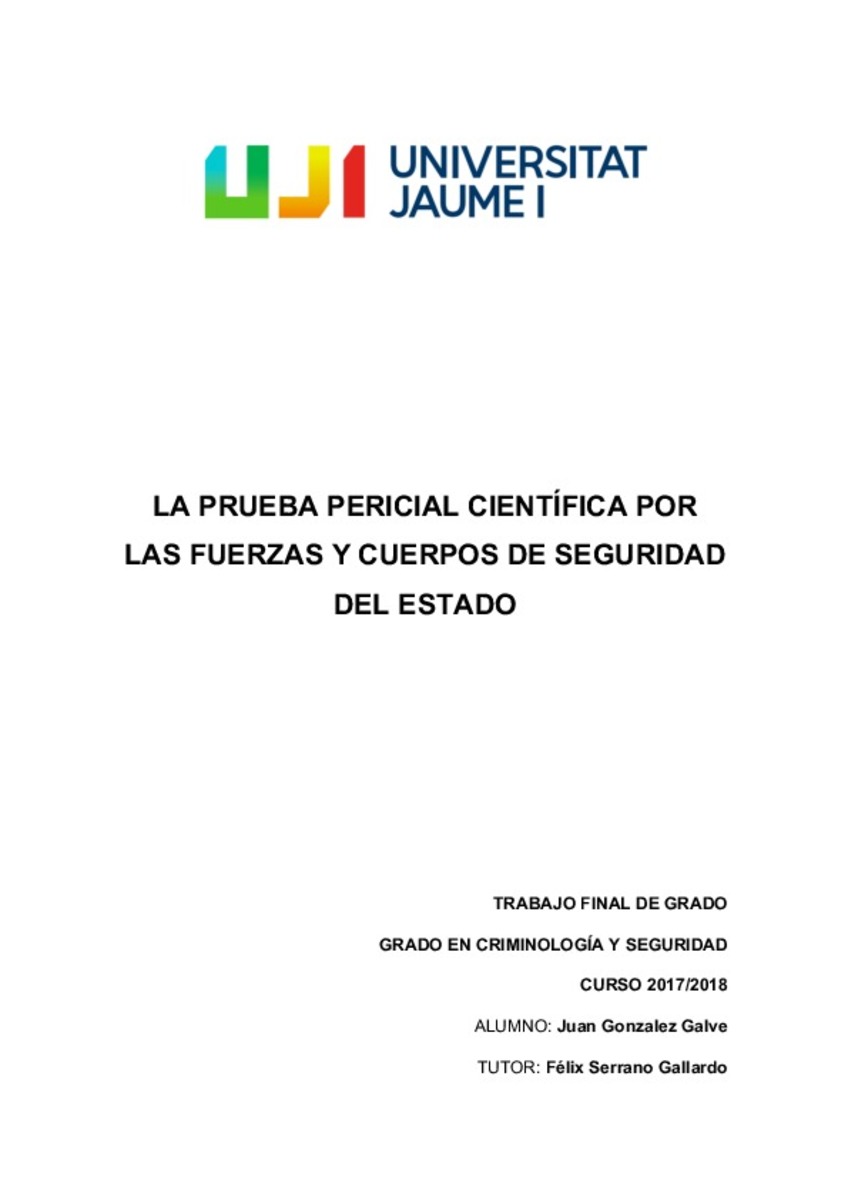Mostrar el registro sencillo del ítem
La prueba pericial científica por las Fuerzas y Cuerpos de Seguridad del Estado
| dc.contributor.author | Gonzalez Galve, Juan | |
| dc.contributor.other | Serrano Gallardo, Félix Francisco | |
| dc.contributor.other | Universitat Jaume I. Departament de Dret Públic | |
| dc.date.accessioned | 2018-02-15T10:12:53Z | |
| dc.date.available | 2018-02-15T10:12:53Z | |
| dc.date.issued | 2017-11-20 | |
| dc.identifier.uri | http://hdl.handle.net/10234/172847 | |
| dc.description | Treball Final de Grau en Criminologia i Seguretat. Codi: CS1044. Curs: 2017/2018 | ca_CA |
| dc.description.abstract | The present work intends to carry out an analysis of the scientific expert evidence in Spain, reflecting its characteristics and its usefulness in the Spanish justice administration system, to specify it on the participation of the Spanish State Security Forces and its laboratories in the investigation of the criminal act and criminal process; presenting the work in four differentiated blocks shown below: First, a brief introduction to why supporting evidence and its need in any judicial process to achieve the conviction of the judge or the whole court about the attributed charges will be discussed, so the truth about what happened can be discovered and can be dictated sentence, condemn or absolutory, adjusted to current law. In a second block an in-depth study of the expert evidence will be done, which is the object of the present report. Its main characteristics, its legal regulation and its conceptual proximity and differences with the documentary evidence, with which in certain occasions it can overlap, will be evaluated. In the third block the scientific evidence in the American system is analyzed, through what is known as the Daubert case, which involved the establishment of a series of rules for the admissibility of the same. 8 At last, the development of this work by analyzing the important contribution of the Spanish State Security Forces to the criminal process, through the generic and specific judicial police, and by the work of the scientific police’s laboratories. Once the analysis of each section is made, some conclusions will be drawn up in which the most relevant treated aspects are synthesized, in addition to including some proposal for the improvement of the current system | ca_CA |
| dc.description.abstract | El presente trabajo pretende realizar un análisis de la prueba pericial científica en España, reflejando sus características y su utilidad en el sistema de administración de justicia español, para concretarla sobre la participación de las Fuerzas y Cuerpos de Seguridad del Estado (FCSE) y de sus laboratorios en la investigación del hecho criminal y en el proceso penal; presentándose el trabajo en cuatro bloques diferenciados de la siguiente manera: En primer lugar, se realiza una breve introducción a la probática y su necesidad en todo proceso judicial para lograr el convencimiento íntimo del juez o tribunal sobre los hechos, para que éste pueda descubrir la verdad acerca de lo acontecido y pueda dictar sentencia, condenatoria o absolutoria, ajustada a derecho. En un segundo bloque nos centraremos en la prueba pericial, que constituye el objeto del presente estudio. Veremos sus características principales, su regulación legal y su cercanía conceptual y diferencias con la prueba documental, con la que en ciertas ocasiones puede llegar a solaparse. 7 En el tercer bloque analizaremos la prueba científica en el sistema Estadounidense, a través del conocido como caso Daubert, que supuso el establecimiento de una serie de reglas para la admisibilidad de las mismas. Terminaremos el desarrollo del presente trabajo analizando la importante aportación de las FCSE al proceso penal, a través de la policía judicial genérica y específica, y, dentro de esta última, por la labor de los laboratorios de la policía científica. Una vez realizado el análisis de cada apartado se elaboran unas conclusiones en las que se trata de sintetizar los aspectos tratados más relevantes, además de incluirse alguna propuesta para la mejora del sistema existente | ca_CA |
| dc.format.extent | 46 p. | ca_CA |
| dc.format.mimetype | application/pdf | ca_CA |
| dc.language.iso | spa | ca_CA |
| dc.publisher | Universitat Jaume I | ca_CA |
| dc.rights | Attribution-NonCommercial-NoDerivatives 4.0 Internacional | * |
| dc.rights.uri | http://creativecommons.org/licenses/by-nc-nd/4.0/ | * |
| dc.subject | Grau en Criminologia i Seguretat | ca_CA |
| dc.subject | Grado en Criminología y Seguridad | ca_CA |
| dc.subject | Bachelor's Degree in Criminology and Security | ca_CA |
| dc.subject | Court | ca_CA |
| dc.subject | Documentary evidence | ca_CA |
| dc.subject | Expert evidence | ca_CA |
| dc.subject | Expert | ca_CA |
| dc.subject | Expertise | ca_CA |
| dc.subject | Investigation | ca_CA |
| dc.subject | Judge | ca_CA |
| dc.subject | Judicial police | ca_CA |
| dc.subject | Laboratory | ca_CA |
| dc.subject | Scientific evidence | ca_CA |
| dc.subject | Scientific police | ca_CA |
| dc.subject | Investigación | ca_CA |
| dc.subject | Juez | ca_CA |
| dc.subject | Laboratorio | ca_CA |
| dc.subject | Pericia | ca_CA |
| dc.subject | Perito | ca_CA |
| dc.subject | Policía científica | ca_CA |
| dc.subject | Policía judicial | ca_CA |
| dc.subject | Prueba científica | ca_CA |
| dc.subject | Prueba documental | ca_CA |
| dc.subject | Prueba pericial | ca_CA |
| dc.subject | Tribunal | ca_CA |
| dc.title | La prueba pericial científica por las Fuerzas y Cuerpos de Seguridad del Estado | ca_CA |
| dc.type | info:eu-repo/semantics/bachelorThesis | ca_CA |
| dc.educationLevel | Estudios de Grado | ca_CA |
| dc.rights.accessRights | info:eu-repo/semantics/openAccess | ca_CA |
Ficheros en el ítem
Este ítem aparece en la(s) siguiente(s) colección(ones)
-
Grau en Criminologia i Seguretat [489]
CS1044








